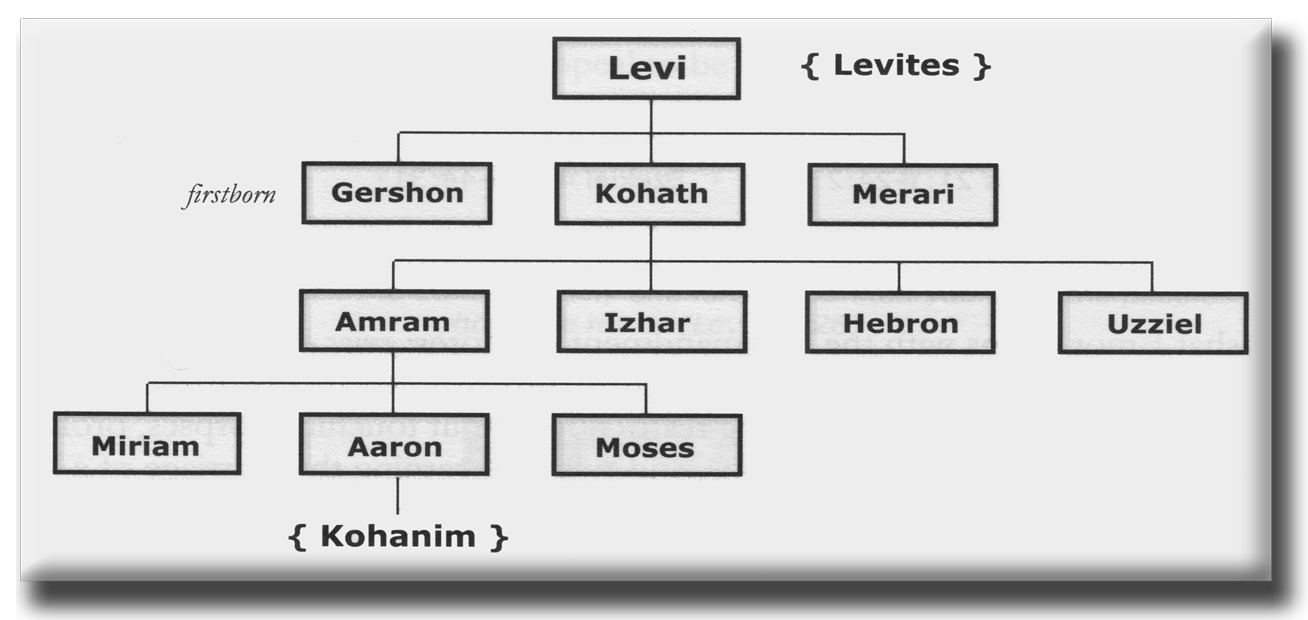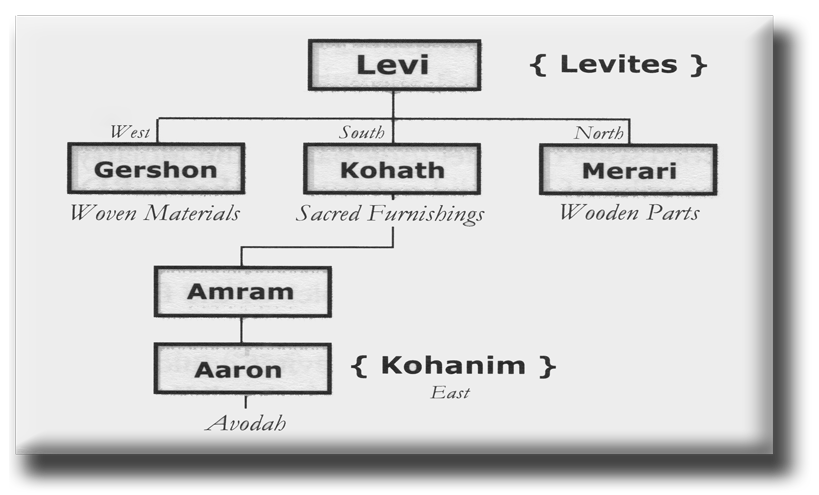Podcast: Download (40.1MB)
 Grace, The Law & Tithing IV
Grace, The Law & Tithing IV
Tithing, Firstfruits, Offerings & Alms .mp3
Overview:
Tonight we continued to pursue a biblical understanding of tithing so we can see if and how it may apply to the New Covenant by recognizing it when we see Paul touch on the subject. We spent some time defining and describing the following:
- Tithe
- The Tribe of Levi and the Priesthood
- Firstfruits
- Offerings
- Alms giving
- The common misunderstanding of II Cor. 9.
As for the Levitical tribe we used a diagram which we found in a book called, A Year Through the Torah by John J. Parsons. This is a very good book which I would encourage any beginning student of the Bible to read. It can be purchased at Amazon – HERE.
When the laws for tithing were given, Israel was largely an agrarian society and that even though they had gold by weight – even the value of the gold was based upon agrarian goods. So even though no mention of tithing money was specifically mentioned (other than by means of substitution for agrarian goods), this was largely due to the fact that during the wanderings tithing agrarian goods applied to EVERYONE!
I have found it difficult to determine with any certainty whatsoever if Israel ever gave a tithe of their monetary increase in such times when they were largely a monetary based society. It seems unreasonable to assume that in a society where more and more people were buying food then growing or breeding it, that the priests should be expected to languish for want of food or money to buy food. It seems not only legalistic, but very assumptive that Israel would not have naturally extended the monetary system into the tithe. Regardless, we know that gold, silver, precious stones and crafted objects made from them, definitely served as offerings given to the priests as is mentioned in Num. 31:50-54. These goods were part of the “spoils of war” which were given to the priests along with sheep, oxen and the like. Furthermore, we know that God saw offerings as required as is illustrated in Mal. 3:8!
On several websites I have read that the temple tax replaced the tithe altogether but this is demonstrably deniable in that Jesus addressed both in His ministry.
Temple Tax
When they had come to Capernaum, those who received the temple tax came to Peter and said, “Does your Teacher not pay the temple tax?” He said, “Yes.” And when he had come into the house, Jesus anticipated him, saying, “What do you think, Simon? From whom do the kings of the earth take customs or taxes, from their sons or from strangers?” Peter said to Him, “From strangers.” Jesus said to him, “Then the sons are free. Nevertheless, lest we offend them, go to the sea, cast in a hook, and take the fish that comes up first. And when you have opened its mouth, you will find a piece of money; take that and give it to them for Me and you.” ~ Mat 17:24-27
Tithe
“But woe to you Pharisees! For you tithe mint and rue and all manner of herbs, and pass by justice and the love of God. These you ought to have done, without leaving the others undone.” ~ Luke 11:42
The history of temple tax dated back to Moses and the two census’ taken in his lifetime. It was the half-shekel atonement money required of all males twenty years and above (Ex 30:11-16). Later in Nehemiah’s time, the Jews paid a third of a shekel to the temple. This was later changed back to the half-shekel and was annually collected from every Jew between twenty years old and above.
This verse is not talking about giving in general, nor giving to the spiritual leaders in the assembly where you worship but about giving to Christians in severe need.
Specifically these verses are talking about a special collection which was being collected by Paul and was being gathered from the Gentile churches to give to the predominately Jewish church in Jerusalem because they were in a famine – Acts 11:27-30; 1Cor. 16:1-5. I encourage you to read the entire account for a clear contextual setting which would require you to begin reading in chapter 8 verse one. I will merely quote excepts for the sake of time.
“Now concerning the ministering to the saints, it is superfluous for me to write to you; for I know your willingness, about which I boast of you to the Macedonians, that Achaia was ready a year ago; and your zeal has stirred up the majority.” ~ 2Co 9:1-2
In the above verse Paul makes it clear that this is a collection for ministering to saints – which means it was NOT taken for the support of the local church or it’s pastors. Again, you would have to actually study the bible to discover what Paul was specifically referring to here which is found in – Acts 11:27-30; 1Cor. 16:1-5.
This was anything but a normal church event, it was a special collection for Christians in famine. Therefore to use it as THE example for ALL giving in the New Covenant is simply irresponsible. To teach it as the substitute for regular giving to your local assembly for the support of the Elders (who will give an account to God for your souls) is absolutely reprehensible! If this passage was difficult to understand these misrepresentations might be overlooked due to ignorance, but when the passage is so incredibly obvious as this, it smacks of bias and hardened hearts.
“Therefore I thought it necessary to exhort the brethren to go to you ahead of time, and prepare your generous gift beforehand, which you had previously promised, that it may be ready as a matter of generosity and not as a grudging obligation. But this I say: He who sows sparingly will also reap sparingly, and he who sows bountifully will also reap bountifully. So let each one give as he purposes in his heart, not grudgingly or of necessity; for God loves a cheerful giver.” ~ 2Cor. 9:5-7
Notice Paul is reminding them that one year prior to this letter, they had promised a bountiful gift. Paul sent messengers ahead of time to see to it that if they had failed to honor their word they would have some time to get their hearts lined up with their mouths and have it ready. In light of Paul’s words it amazes me that people read this as a New Covenant command to “only give if it makes you happy” or “if you can do it cheerfully”. If read in context, it would be much easier to see an entirely different view!
The “cheerfulness” of the Corinthian church is NOT what Paul was concerned with here. In fact, if Paul had not wanted them to feel under any “obligation” to give, I think any reader would have to say he did a pretty lousy job of communicating that to them. No, Paul if fact presses these people to give using the Macedonians as an example because they had given abundantly out of their deep poverty!(1Cor. 8:1-8) Paul is so adamant with these Corinthians that he actually pits the giving of these poor Macedonians against the amount they give as a “TEST” of the sincerity of their love.
“I speak not by commandment, but I am testing the sincerity of your love by the diligence of others.” ~ 2Cor. 8:8
Furthermore, Paul presses on them the fact that they are under obligation to keep their word of promise,
“And in this I give advice: It is to your advantage not only to be doing what you began and were desiring to do a year ago; but now you also must complete the doing of it; that as there was a readiness to desire it, so there also may be a completion out of what you have.” ~ 2Cor 8:10-11
I do not deny that Paul tells these Corinthians that God loves a cheerful giver, but in light of all he says before and following that verse it seems that their cheerfulness was optional though their hearts SHOULD be loving enough to meet their obligation with joy. The issue here is not to lower the pledge to meet the cheerfulness of their hearts, but to raise their hearts to meet the cheerfulness of their pledge! It is interesting to me that Paul preludes this statement with yet another verbal nudge to give as much as possible without hurting themselves in the process.
“But this I say: He who sows sparingly will also reap sparingly, and he who sows bountifully will also reap bountifully. So [with this in mind] let each one give as he purposes in his heart, not grudgingly or of necessity; for God loves a cheerful giver.” ~ 2Cor. 9:6-7
Perhaps the most humorous aspect of this entire passage (especially for those who are so legalistic with their “grace”) is that Paul quotes and refers to from the Old Testament law no less than 5 times to make and justify this New Covenant point throughout the narrative in chapters 8 and 9!
The issue being addressed in these chapters was NOT that all giving needs to be cheerful, but that it needs to be given from a heart which is first given to God and then extended bountifully to your brother. Also, it is clear that love is evidenced by cheerfulness in giving – even beyond your means (2Cor. 8:2-4).
Paul’s message to these Corinthians was that if they promised to help their brothers in need with an abundant gift, don’t cry foul when I come to pick it up! If your heart is NOT happy to give it – then I am giving you time to get it that way, because either way – I’m coming for the money!
We will pick up here next week.
I hope this teaching will challenge you and encourage you to study the scriptures for yourself and ultimately to place your trust in the Lord Jesus Christ as Savior and Lord.
You have a special place in God’s family & kingdom. If you do not know Him, please use our ‘Contact Us‘ page and reach out so we may have the privilege of introducing you to the Lord. Attendance at our church will NOT even be mentioned nor will money.
If you have been spiritually fed by this ministry and wish to give, we truly appreciate that and you may do so here, but all outreaches of this ministry are FREE for you and anyone to enjoy at no cost.
Blessings!

